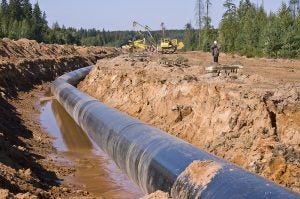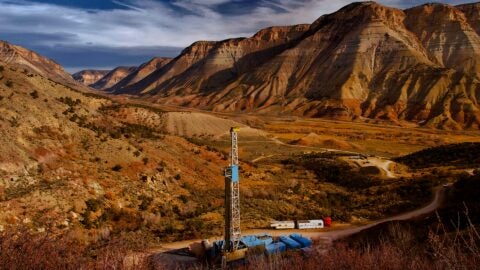New York regulators must act on Con Edison’s contract with Mountain Valley Pipeline
 The CEO of New York gas utility Con Edison recently made the bold statement that natural gas is “no longer…part of the longer-term view” in the transition to a clean energy economy, and that he does not expect the company to make additional investments in natural gas pipelines. Many of the company’s actions — from its clean energy commitment, to its framework for pursuing non-pipe alternatives — place it on a path toward meeting that vision. But Con Ed’s investment and contract with Mountain Valley Pipeline call into question that bold statement and demand further scrutiny from the New York Public Service Commission.
The CEO of New York gas utility Con Edison recently made the bold statement that natural gas is “no longer…part of the longer-term view” in the transition to a clean energy economy, and that he does not expect the company to make additional investments in natural gas pipelines. Many of the company’s actions — from its clean energy commitment, to its framework for pursuing non-pipe alternatives — place it on a path toward meeting that vision. But Con Ed’s investment and contract with Mountain Valley Pipeline call into question that bold statement and demand further scrutiny from the New York Public Service Commission.
In 2016, Con Ed signed a 20-year contract for service on Mountain Valley Pipeline, a planned 300-mile pipeline in West Virginia and Virginia. Mountain Valley would connect with other pipelines on the East Coast to transport natural gas from the Marcellus Shale for ultimate delivery to the New York region. Since Con Ed entered the contract, the pipeline has been plagued by environmental and economic risks and significant legal challenges, and it is still not in service.
Affiliate contracts can harm everyday energy customers
Con Ed’s decision to enter a contract with the pipeline is particularly concerning because its affiliate company, Con Edison Transmission, is a 10% owner in the pipeline.
When affiliated companies play on both sides of a gas pipeline — with one company as a pipeline developer and the other company, a utility, agreeing to buy transportation service from the pipeline — the result can enrich the developer and its shareholders, to the detriment of captive customers funding the project through their monthly energy bills. An EDF analysis indicates that Con Ed customers would shoulder $1.2 billion in costs for the Mountain Valley Pipeline, regardless of whether the company uses the pipeline capacity.
New York regulators must act on Con Edison’s contract with Mountain Valley Pipeline Share on XCon Ed’s affiliate contract has never been scrutinized by the commission, despite repeated requests by EDF over the last three years. To ensure ratepayers are protected, EDF has called on the commission to clarify the law regarding oversight of these types of agreements. By acting on EDF’s petition and opening a separate proceeding to address the Mountain Valley Pipeline contract, the commission can ensure a forum is available to determine whether the contract is in the public interest.
Regulators tasked with ensuring that customer rates are just and reasonable have a responsibility to review every cost. Customers facing financial hardships stemming from the global pandemic should not be burdened by unnecessary costs, and communities hit hardest by COVID-19 are disproportionately low-income. Now more than ever, strong regulatory oversight is necessary to protect these customers.
Con Edison remains committed to a risky investment
The Mountain Valley Pipeline has faced substantial delays, including for an investigation of potential criminal and civil violations of the Clean Water Act and other federal statutes. The project lacks the required regulatory approvals and was recently described as “troubled.” The developer has claimed the project will go into service “late 2020” — almost two years after the planned in-service date — but independent analysts project that the pipeline will be further delayed.
Given these delays, Con Ed recently had the opportunity to exit its 20-year commitment to Mountain Valley Pipeline, but it did not act. A provision in Con Ed’s contract allowed the utility to terminate its agreement with Mountain Valley Pipeline as of June 1, 2020, since the project still has not gone into service. But Con Ed did not exercise that option when it had the opportunity, despite statements of company leadership painting a new vision for the future role of gas. And Mountain Valley is rushing forward with construction despite environmental concerns.
Moving toward a cleaner future
New York is moving forward with bold climate commitments through its implementation of the Climate Leadership and Community Protection Act, which has serious implications for natural gas utilities. The commission recently initiated a much-needed gas planning proceeding that acknowledges the need to examine affiliate agreements for “incentives that are not aligned with state policies.” That examination must come in the form of specific review of affiliate contracts that pose serious risks to consumers and the state’s climate goals.
EDF is renewing our call for scrutiny of affiliate agreements in New York. We are asking the commission for a ruling that Con Ed’s contract with Mountain Valley Pipeline, and other such contracts for natural gas transportation, are eligible for disapproval if the commission determines the contract is not in the public interest. Clarity on the law is an essential first step to ensure that Con Ed’s contract is subject to necessary scrutiny.
It’s time for Con Ed to justify its 20-year commitment to the Mountain Valley Pipeline. Commission action on EDF’s petition is urgently needed to ensure that a forum is available for review of the company’s contract with the pipeline. We must ensure that customers and the environment are not harmed by unchecked affiliate dealings.











